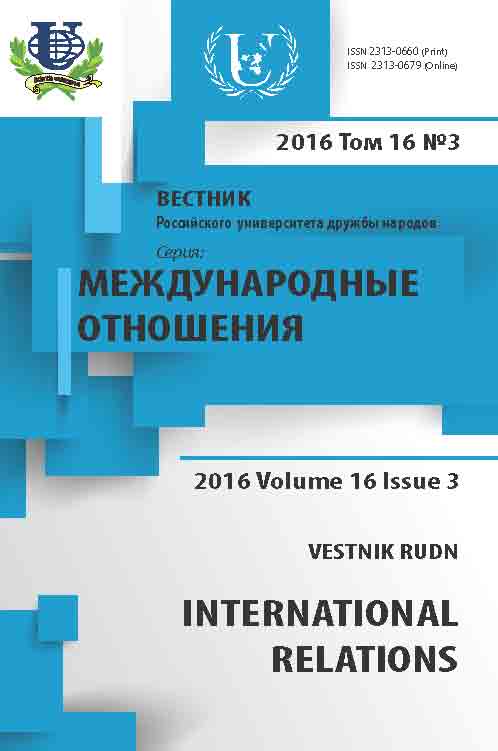Conflicts in Africa and Major Powers: Proxy Wars, Zones of Influence or Provocative Instability
- Authors: Tafotie J.R.1, Idahosa S.O.1
-
Affiliations:
- RUDN University
- Issue: Vol 16, No 3 (2016): International Conflicts: Quo Vadis?
- Pages: 451-460
- Section: ARTICLES
- URL: https://journals.rudn.ru/international-relations/article/view/14763
- ID: 14763
Cite item
Full Text
Abstract
The article analyses the different nature of conflicts that have occurred in Africa since the end of Cold War. A special attention is given to the role of external factors in the process of conflict evolution and the escalation of violence on the African continent. In effect, this paper demonstrates through a critical examination of the meaning of proxy war as, zone of influence or provocation of instability as a strategy and an analysis of its employment by the United States and China, France etc. in Africa. The new potential confrontation between the United States and China as in Sudan, France in its former coloniesis not only based on a clash of world views about the structure and nature of international relations and security but largely over the control of strategically vital energy resources based in Africa. The authors conclude that this ultimately creates permanent tensions or bitter conflicts between the actors and African populations as a factor that have negative impact on the peace and stability of continent. According to the context of superpower conflict strategies, this paper critically examines, zone of influence, provoking of instability or proxy war as a viable national strategy of nuclear armed great powers in advancing and/or defending their global national interests in a bipolar/multipolar international system.
About the authors
Jerry Rowlings Tafotie
RUDN University
Author for correspondence.
Email: jerryrowllings@yahoo.fr
Moscow, Russia
Stefan Osaherumven Idahosa
RUDN University
Email: 1032094415@pfur.ru
Moscow, Russia
References
- Adekunle Amuwo. (2009). Capitalist Globalisation and the Role of the International Community in Resource Conflicts in Africa. Africa Development, XXXIV (3-4), pp. 227–266.
- Alden, Ch. (2007). China in Africa. New York: Zed Books.
- Bill, L., Scott, L. (1986). The world deployed : US and Soviet military intervention and proxy wars in the Third World since 1945. From: Robert W. Clawson (Ed.): East West rivalry in the Third World. Wilmington, pp. 77-101.
- Dallaire, R. (2005). Shake Hands with the Devil: The Failure of Humanity in Rwanda. London: Arrow Books.
- Griffin, Ch. (2015). Operation Barkhane and Boko Haram: French counterterrorism and military cooperation in the Sahel. Trends Research and Adversary. Université de Savoie.
- Kinzer, St. (2008). A Thousand Hills: Rwanda's Rebirth and the Man Who Dreamed It. London: Wiley Books.
- Loveman, Ch. (2002). Assessing the Phenomenon of Proxy Intervention. Conflict, Security, and Development, 2(3).
- Lugt, S. van der. (2014). China-Africa: An evolving relationship but invariable principles. GREAT Insights, 3(4).
- Lyman, P., Morrison, J.S. (2006). More Than Humanitarianism: A Strategic US Approach Towards Africa. Council on Foreign Relations.
- Melvern, L. (2004). Conspiracy to Murder: The Rwandan Genocide. London and New York.
- Nye, J. (1990). The Changing Nature of World Power. Political Science Quarterly, 105(2), pp. 177-192.
- Richard, J. (2003). Africa: States in Crisis. Journal of Democracy, 14(3), pp. 159-70.
- Prunier, G. (1999). The Rwanda Crisis: History of a Genocide. 2nd ed. Kampala: Fountain Publishers Limited.
- Shambough, D. (2000). Sino-American Strategic Relations: From Partners to Competitors. Survivor, 42(1), pp. 97-115.
- Stone, G.D. (2010). In Proxy War: A Critical Examination of Superpower Indirect Conflict in Africa. A Thesis Submitted to the Faculty of Graduate Studies In Partial Fulfillment of the Requirements for the Degree of Master of Arts Department of Political Studies, Faculty of Arts University of Manitoba.
Supplementary files










